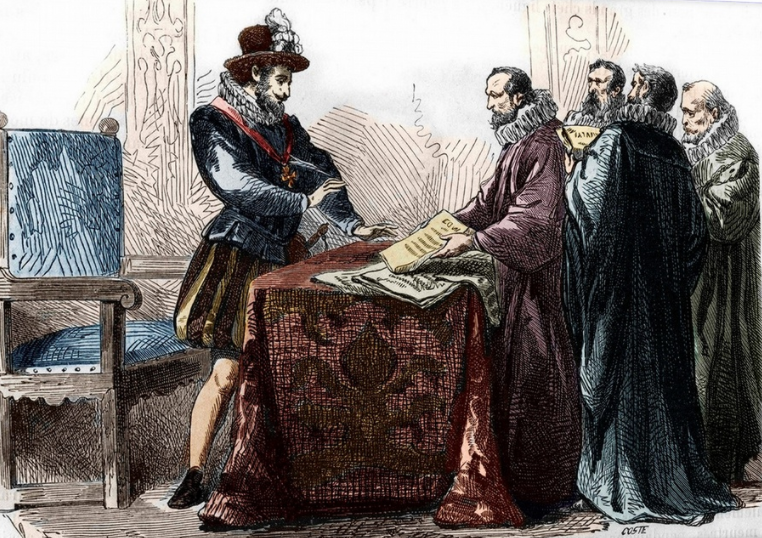(Receive our blog posts in your email by clicking here. If the author links in this post are broken, please visit our Free PDF Library and click on the author’s page directly.)
It was on April 13, 1598 that the Edict of Nantes was signed by Henry IV of France granting a measure of religious liberty to French Huguenots after decades of armed conflict with the Roman Catholic majority. This event is a major landmark in the history of Western civilization as well as Protestant church history. The civil and religious freedom granted to suffering Huguenots in 1598 was gradually undermined and finally revoked by Louis XIX in October 1685, leading to the world-wide French Huguenot Diaspora. But freedom, in God’s Providence, always find a path to victory over tyranny.
The signing of the Edict of Nantes by Henry IV on April 13, 1598.
For reflections on the importance of the Edict of Nantes, we turn today to the writings of an American Presbyterian who specialized in the history of the French Huguenots, Henry Martyn Baird, who called it “one of the most illustrious of laws ever enacted in behalf of religious liberty” (The Huguenots and Henry of Navarre, Vol. 2 (1886), p. 414.
For both Henry M. Baird and his brother Charles, the Edict and its Revocation were among the most important miles in the history of the French Huguenots and indeed in world history.
It was on the 200th anniversary of the Revocation that Henry addressed the Huguenot Society of America on The Edict of Nantes and Its Recall (1886) and it was on the 300th anniversary of the Edict itself that Henry addressed that same body on The Strength and Weakness of the Edict of Nantes (1898). The combined historical studies by Henry and Charles of the rise and diaspora of the French Huguenots, and Henry of Navarre (Henry IV), all highlight the Edict as the highwater mark of civil and religious liberty in this period, and its Revocation as a terrible blow to freedom (which God nevertheless used for much good in spreading his people across the globe), and thus it is worth recalling to mind this chapter of church history. It is never inapropos, and indeed always timely, to study the history and principles of freedom under God.


